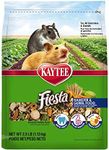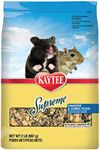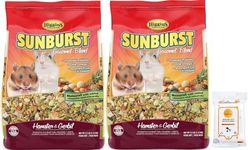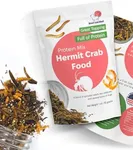Buying Guide for the Best Hamster Foods
Choosing the right hamster food is crucial for the health and well-being of your pet. Hamsters have specific dietary needs that must be met to ensure they stay healthy, active, and happy. When selecting hamster food, it's important to consider the nutritional content, the type of food, and any specific dietary requirements your hamster may have. Here are some key specifications to look for and how to choose the best fit for your furry friend.Nutritional ContentNutritional content refers to the vitamins, minerals, proteins, fats, and carbohydrates present in the food. This is important because a balanced diet is essential for your hamster's health. Look for foods that provide a good mix of these nutrients. High protein content (around 15-20%) is important for growth and muscle maintenance, while fats (around 5-7%) provide energy. Carbohydrates should be present in moderate amounts. Vitamins and minerals are crucial for overall health. Choose a food that offers a balanced nutritional profile to meet your hamster's dietary needs.
Type of FoodHamster food comes in various types, including pellets, seed mixes, and lab blocks. Pellets are uniform in shape and prevent selective eating, ensuring your hamster gets a balanced diet. Seed mixes offer variety but can lead to selective eating, where the hamster picks out its favorite parts and leaves the rest. Lab blocks are nutritionally complete and prevent selective eating. If your hamster is a picky eater, pellets or lab blocks might be a better choice. If you want to provide variety, a seed mix can be used, but ensure your hamster eats all components.
IngredientsThe ingredients in hamster food determine its quality and nutritional value. Look for foods with natural ingredients and avoid those with artificial colors, flavors, and preservatives. Whole grains, seeds, nuts, and dried fruits are good ingredients. Avoid foods with high sugar content, as they can lead to obesity and other health issues. Check the ingredient list to ensure the food contains healthy, natural components that will benefit your hamster.
Special Dietary RequirementsSome hamsters may have special dietary needs due to age, health conditions, or breed. For example, dwarf hamsters are prone to diabetes and may require a diet lower in sugar. Older hamsters might need softer foods that are easier to chew. If your hamster has any specific health issues, consult with a veterinarian to determine the best diet. Choose a food that caters to any special dietary requirements your hamster may have to ensure they stay healthy.
Freshness and StorageThe freshness of hamster food is important for its nutritional value and taste. Check the expiration date and choose the freshest food available. Proper storage is also crucial to maintain freshness. Store hamster food in a cool, dry place, and keep it in an airtight container to prevent it from going stale or attracting pests. Fresh food will be more appealing to your hamster and provide better nutrition.





















